Peter MALONE
Felon
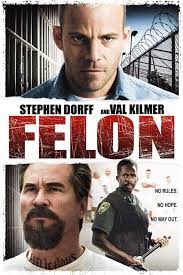
FELON
US, 2008, 104 minutes, Colour.
Stephen Dorff, Harold Perineau, Val Kilmer, Marisol Nichols, Sam Shepard, Nick Chinlund, Nate Parker.
Directed by Ric Roman Waugh.
There have been many prison films over the decades, some classics, as well as documentaries – one thinks of film versions, features and documentaries about the writing in Attica, 1971.
While this is a fiction, it is based on events in American prisons during the 1990s, especially the role of the guards, the setting up of in-house fighting between the inmates, betting, corruption.
In a way, the basic plot is familiar. We are introduced to a loving family, a home invasion, the father, Wade, defending his family with a baseball bat, killing the intruder who was unarmed. He is arrested, charged with murder, a plea altering it to unintentional manslaughter.
Then there are the expected entry into prison sequences, familiar but nonetheless tough. On the bus to prison, another inmate stabs another to death, the knife dropped and pushed under the seat, Wade charged, his decision for safety to cover for the actual killer.
And then there are scenes of the prison, the cells, solitary, the brutality of the inmates, the enclosed yard and the setting up of the fights between the prisoners, Wade becoming involved, able to defend himself.
The film also shows the familiar portrait of warden and guards – but, with one guard, Jackson, played by Harold Perrineau, seen as a pleasant family man with his son but urging him to fight back against bullies, then taking charge in his area of the prison, organising the fights, having a pistol to shoot the fighters when things don’t go his way. We are also introduced to a sympathetic young new wardsman, played by Nate Parker.
The drama is enhanced by the presence of another prisoner, John Smith, a very interesting performance by Val Kilmer, who has developed kind of mystical survival routine, shares the cell with Wade, helps him to affirm himself, finally writing a letter, urging him for his future, and then sacrificing himself in the yard.
Marisol Nichols plays his wife, the hardship of selling the house, the business, with the boy, and her dominating and critical mother, played by Anne Archer. There is also a corrective officer who had been saved by John Smith in the past, played by Sam Shepard, who visits him in prison and is finally asked to intervene on Wade’s behalf.
The film is directed by Ric Roman Waugh, director of many action films including Angel has Fallen.
- The title and expectations? Tough prison film? Based on actual events of the 90s, abuses by authorities against prisoners? The final message – and the number of incarcerated, millions, in the United States?
- The opening, the ordinary family, bonds between them, workplace, enterprise, friendships? Wade, boss, payments? The home invasion, the response, his hitting the invader with the baseball bat, killing him? Laura phoning the police?
- Wade and his arrest, the charges, murder, the burglar without weapons? Legal advice, involuntary manslaughter? The sentence? Laura’s response, her critical mother?
- The procedures of going into prison, familiar, humiliating? Internment, the tough criminals, Wade attacked?
- The bus, the murder on the bus, the shiv, under Wade’s seat, Snowman implicating him? The murder and his look, control? The guards, Wade under guard, interrogated, his covering? Transferred into the security centre? His cell, isolated, reaction of other prisoners, the guards?
- Jackson, his role in the prison, seeing him with his son, affectionate father, yet encouraging him to fight back? His son’s later injury and his violent reaction, his weeping reaction? His role in the prison, in charge of the area, working with the other guards, their bonds, the particular yard, the men, encouraging them to fight, the bets, and his shooting to injure fighting prisoners? His callous attitudes? The higher authorities and their permitting his regime?
- The introduction to John Smith, his character, the encounter with Gordon, his helping Gordon in the past, Gordon helping him in prison? His transfer, into the cell with Wade, his philosophies of life, theories about time changing? Appearance, manner, way of speaking, his writing? In the yard? The relationship with Wade, tentative, Wade asking questions, Smith responding, helping him, advice, covering for him in the yard?
- The fight in the yard, Wade and his success, Jackson firing at him?
- Collins, young and enthusiastic, the interview, Jackson taking him under his wing, his observing what was happening, disapproval, alienated, offer of help to Wade? The encounter with Jackson and his family at the supermarket, genial, Collin’s wife and her response? Collins later talking with Wade, offers of help, in the final supervision of the fight, the surveillance?
- Laura, the effect of the imprisonment, financial difficulties, with her mother, her mother’s criticism, with her son, selling the business, eventually selling the house? The visits to the prison, bringing the boy? Wade and his desperation, Laura explaining that she was living to survive? Her mother’s pressure, wanting to separate, the message? But the confrontation with her mother, finally coming to the prison for reconciliation?
- Wade, the further accusations, Jackson and the implications, charged with conspiracy, further longer sentence?
- Wade, character, the effect on him? The discussions with Snowman? Becoming part of the white group, shaving his head, the fights? The various bouts, Jackson and his shooting?
- The ultimate setup, the fight in the yard, Smith and his intervention, everybody supporting Wade against Jackson, Jackson coming to the yard, Smith and his ship, killing Jackson? The guard shooting, Smith’s death?
- Laura, going to see Gordon, calling the FBI, travel, eventually intervening, the criticisms of the warden, the final release? And the importance of Smith’s letter to Wade? Possibilities for the future?
Knock at the Cabin
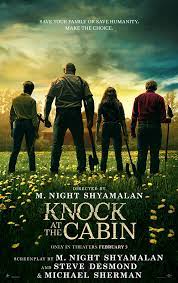
KNOCK AT THE CABIN
US, 2023, 100 minutes, Colour.
Dave Bautista, Jonathan Groff, Ben Aldridge, Kristin Cui, Nikki Amuka-Bird, Rupert Grint, Abby Quinn.
Directed by M. Night Shyamalan.
Fans of the eerie and apocalyptic will be pleased to open this knock at their door. But, it is the kind of knock on the door that ordinary people would not want to open.
First of all, it is important to say that this is a M. Night Shyamalan. He has been producing them for a quarter of a century, making a huge impact in 1999 with The Sixth Sense and that frequently quoted “I see dead people”. During the 2000s he made quite a number of eerie films, starting with Unbreakable. In more recent times he has touched horror and psychological quests in Split and Glass.
This particular cabin is out in the woods, surrounded by beautiful trees, summer weather. Little girl, almost 8, Wen, is catching grasshoppers playfully. (Kristin Cui use remarkably convincing performance.) And then, Leonard suddenly appears, a huge man (played very effectively by Dave Bautista), but gently spoken, wearing glasses, catching grasshoppers with her. But, she has been told not to talk to strangers. And this stranger demands that he and his friends come into her house and meet her fathers.
What seems at first like home invasion, the four visitors starting to smash their way in, Wen and her fathers, Eric and Andrew (Jonathan Groff and Ben Aldridge), fearful, defensive, but overwhelmed. But this is not a robbery – Leonard announces that he and his companions have had visions, and the end of the world is nigh, and to save humanity from absolute destruction, they have received a message that disaster will be averted only by this family, and their deciding that one of them must be killed as a sacrifice.
Apocalyptic themes have been very popular in recent years, all kinds of motivations, climate change especially, but it is not clear why this particular apocalypse should happen.
The film becomes more eerie as the family refuses the offer to sacrifice one of them – and television sequences indicate the beginnings of world disasters, huge tsunamis, and planes falling from the sky, infections and plague… And, as the family refuse, successive members of the group die. With their backgrounds of teaching, cooking, nursing, protection, they are interpreted as variations on the Four Horsemen of the Apocalypse.
The writers and director have decided to enhance feelings of apprehension by inserting a number of flashbacks during the terror, as each member of the family thinks back to past events – which is the opportunity for the filmmakers to give some background to the other principal theme, the same-sex marriage, the two fathers’ parenting their adopted child, the experience of family alienation, some homophobic brutality. And then back to the present and the terror.
Of course, the filmmakers are wanting to frighten audiences, not just with the terror, but with the challenge of asking what we would do if this situation arose, sacrifice a member of the family for the good of humanity, or preserve the family unity – even if it meant wandering the earth alone forever.
Which means then that given this scenario, there has to be a willing suspension of disbelief in the theme, and, for the very rationalist audiences, a willing suspension of scepticism.
But, that is what most of M. Night Shyamalan films ask of their audiences. (And in the Hitchcock tradition, he makes a cameo appearance in each of his films, here a television personality in an informercial.)
- The title? The eerie tone? Expectations from the director and his previous films?
- Apocalyptic themes, their popularity in popular media, films, reasons for the Apocalypse? No clear reason given here? Leaving it to audience imagination? Leaving it to audience religious beliefs and expectations?
- The setting, the holiday home, the cabin, exterior, interiors, the woods around?
- The television clips, the cartoons, then the disasters, tsunami, plague, planes falling from the sky, then the re-establishing of normality?
- Suspension of disbelief, suspension of scepticism?
- The tone of the opening, Wen, age, catching the grasshoppers, bottling them, the encounter with Leonard, not talking to strangers, his friendly tone, catching the grasshopper? Then demanding to enter the house?
- The family situation, the two fathers, the adopted daughter – and the flashbacks illustrating the situation, Eric and his parents and their wariness, the adoption sequence, the bar, Eric and Andrew and their discussion, the attack by O’Bannon? These flashbacks inserted within the terror, interrupting the terror, breathing space, then returning to the terror?
- The mystery of the four characters, the explanation, Leonard as being a teacher in Chicago, the photo, enjoying teaching children? Sabrina, a nurse? Redmond, his explanation of himself, his false name? Adrienne and her love of cooking?
- Outside the door, the four, the terror inside, uncertainties, barring the doors, closing the windows? The knock at the door, the bashing, the breaking of the windows? Redmond and his intrusion, the fight with Eric, Eric’s injuries, concussion, Sabrina caring for him? The family overcome, the two men tied up?
- Explanations, each of the four introducing themselves, their background, motivations? Seeing the visions, sharing the visions online, the coming together, their mission, to save the world, the time deadlines?
- The reaction of Eric and Andrew, disbelief, Andrew and his psychological background, belief, motivations? The violence, tied up, trying to get free?
- The explanation of the situation, the refusal to consent, the effect on Wen, Redmond, the first to be sacrificed, Leonard killing him, removing his body, Sabrina clearing the blood? The continued refusal, the anguish of the fathers, Wen and her fear, the flashbacks?
- Adrienne, the explanation, her death?
- The television episodes, the disasters, the television treatment? The men and the suspicion that these were pre-recorded?
- Wen, escaping the house, hiding in the woods, captured by Leonard? Back in the house? Andrew getting out of the house, the car, Sabrina following him, slashing the tires, his getting the gun, shooting her?
- Leonard, overpowering and again, the gun, the clashes and fights? Andrew and his being wounded?
- The deadline, the family refusal, Leonard killing himself? The weather, the lightning, the change in the weather, the news on the television, everything coming back to normal?
- The effect on Eric, believing them, his emotions, the concussion and the consequences, love for Andrew and Wen, the decision that he would give his life? His death?
- The audience challenged about what they would do in similar circumstances?
Sniper: Ultimate Kill
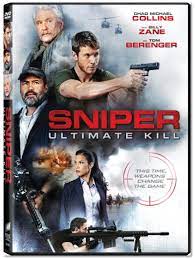
SNIPER: ULTIMATE KILL
US, 2017, 90 minutes, Colour.
Chad Michael Collins, Danay Garcia, Billy Zane, Tom Berenger, Joe Lando.
Directed by Claudio Fah.
The Sniper franchise began in 1993 with a thriller, set in Mexico, showing the work of the sniper, with that as the title. In the early 2000s, there was Sniper 2, Sniper 3. Later in the decade, a decision was made to start the franchise again, this time focusing on the son of the original sniper, Tom Berenger. He was to be played by Chad Michael Collins – who was to appear in all the later Sniper action films, from 2008 to 2022 and on. Tom Berenger appeared in a number of these, in retirement and under threat and his son helping to save him, he is still in action and in control of the mission in Colombia. Billy Zane also appeared in several of the films, sometimes in action as a Sniper, then later as a Washington official.
This film is set in Colombia, the suicide of a fellow soldier, the effect on Brandon Beckett, Billy Zane as commander sending him to Colombia where his father is in charge. The local aim is to capture one of the drug lords. However, the drug lord has employed a Sniper, very accurate, who kills one of the government soldiers during a botched assignment. In charge, locally, is a young woman, played by Danay Garcia.
The background shows sequences of the drug lord, playing billiards, dominating his henchman, but eventually caught and transferred to Miami. There is also the background of the sniper, his skills, his contacts, seeing him in action.
The culmination of the film is in Miami, the transfer of the drug lord to prison, the setting up of a decoy, shooting by the sniper, and Brandon Beckett shooting him – and, the revelation that there was a traitor with mixed patriotic motives, in contact with the drug lord. At the end, Tom Berenger’s character retires to go fishing – which is where he appears in a later episode.
The film was directed by Claudio Fah who directed one of the earlier Sniper films with Chad Michael Collins.
- The popularity of the Sniper franchise, the original film in the nineties, continuing to the 2000s, and continuing even into the 2020s.
- Production, the cast and re-appearances, the range of directors and repetition? Locations, scenic aspects as background to the plots, local atmosphere, the musical score?
- The title, the mission in Colombia, collaboration with the Colombian authorities, the drug lord, the sniper?
- The opening, the suicide, the pressure on military, on the snipers? Brandon, at the funeral, the encounter with his boss, the conversation, commanding him to Colombia? And his father in charge of the operation?
- The authorities in Colombia, the group, the American presence, DEA, Brandon, driven from the airport, meeting the group, the local members, Kate, strong character, making her presence felt, the search for the drug lord?
- The strategies, the urgency, the mission, the ambush, the hut exploding, the office of being killed? Kate’s reaction?
- The Sniper, the drug dealer in the bath with his mistress, shot in the bath, the accuracy of the sniper, his bullets, the curves, the introduction to the sniper personally, with the woman, with his associates, the setup and the killing of the officer in the ambush? His scouting out the headquarters, the mission, confronting Brandon, the capture of the drug lord?
- The drug lord, arrogance, playing billiards, threatening his henchmen, the information, coming out of the building, his capture? Imprisoned? Transfer to Miami?
- The drama in Miami, the transfer of the drug lord, the decoy, the two snipers, the shooting of the van, its being steered automatically, the drug lord in the car, Brandon knowing where the sniper was, returning fire, his death?
- The achievement, the authority from Washington, Beckett and his command, retiring, reconciliation with his son, Kate and Brandon? And the unmasking of the official and his fall splat reasons for being in contact with the drug lord?
Infiesto
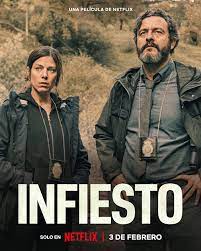
INFIESTO
Spain, 2023, 96 minutes, Colour.
Isak Gerriz, Iria del Rio, Antonio Buil, Juan Fernandez, José Manuel Pogo.
Directed by Patxi Amezcua.
Infiesto is the name of a mining town in the Asturias mountains. It is the location for a mysterious kidnapping, something of a cult, apocalyptic, atoning a storm god, and trying to prevent the end of the world.
The film creates the atmosphere of the town, the atmosphere of the mines, industry, streets, homes, hospitals, police. With the discovery of a kidnapping and the rescue of a young woman, two police from out of Infiesto are brought in to investigate.
In many ways, this is a familiar genre, the police partners, men and woman, working together, details of their investigation, detection, clues, interviews, confrontations… There is also the character of the Commissioner who is supervising their investigation. Then, other kidnappings are discovered, suspects unmasked, leading to the leader of a cult, The Prophet, the suggestion of rituals, sacrifice, atonement to the God of Storms, Druid traditions.
What makes the film different is the background of the early months of the pandemic, the initial experience of covid. There is background about how the government in Spain is dealing with the initial pandemic, masks, isolation, lockdown, curfews, the number of deaths in early 2020. Indications of each day of lockdown are indicated on screen, the cumulative effect of the investigation and its urgency.
With the deaths of many of the young people kidnapped and sacrificed, the film becomes something of a murder mystery until the unmasking of The Prophet, and the confrontation with the chief investigator and pessimistic ending with his death.
Audiences who enjoy this kind of police investigation will be interested in the drama of this film.
- Spanish police investigation? Mystery? Apocalyptic tones? In the context of Covid?
- The title, the town, the spurious mountains, mining and industry?
- The background of Covid, the lockdown, the indication of each day of lockdown? The case, kidnapping, investigation, leads, links, characters, motivations, the cult of The Prophet?
- The girl found on the highway, the back story, her mother and concern, hospital, gradual recovery, the nursing staff, the psychologist, decisions about reminding the girl of her ordeal, identifying the photos, indicating three men?
- Garcia, his reputation, skills, age, contact with his family, his drinking, attitudes of fellow workers? Working with Castro, her experience, her concern about Carlos and Covid? Their working together? The film showing their methods, skills, leads, investigations, confrontations with suspects, the exploding shack? The investigations of buildings, the basements, photos, religious symbols, working with the Commissioner? Their diligence, working non-stop?
- The initial lead, the hunter, confrontation, his being unemployed, his fierce dog, his escape, shooting the dog, pursued, his gun, shooting himself? The investigation of his phone calls, leading to his cousin, the Demon? Tracking down the Demon? The heart, empty, the explosion? Arresting him, the interrogation? Garcia, the gun, bashing him, the threats? Castro watching? The arrival of the Commissioner, suspending Garcia without pay?
- Building up the information, the identity of those captured, every three months?
- The mystery of The Prophet? The photo, the suspects as boys with him? Reputation in the town? The local police, everybody knowing everyone else?
- The episode with Lydia, watching, outside the police station, the hood? Castro not making the connection, with the help, the interview, the name of The Prophet?
- Castro, her own investigations, interviews, and going down into the mine?
- Garcia, working overtime, on his own, going to the hut, Ramos offering to help, revealing himself, the confrontation, Garcia being killed? The death of The Prophet?
- The apocalyptic tone, the comments about the end of the world, the pandemic at its beginnings, the Spanish government and meetings, lockdown, isolation, masks, indications of an end of the world?
Honeymoon, The/ 2022
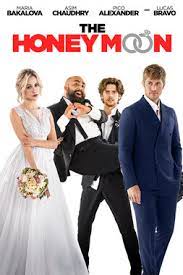
THE HONEYMOON
UK/Italy, 2022, 97 minutes, Colour.
Maria Bakalova, Asim Chaudhry, Pico Alexander, Lucas Bravo.
Directed by Dean Craig.
A positive review of this comedy drama is that it is comedy for an unsophisticated audience.
Another positive feature would be the location photography, especially at the opening wedding in the Lakes District, a great deal of the beauty of Venice, and, less so, the countryside of Slovenia.
Reviews have generally been unfavourable despite the fact that the film has been written and directed by Dean Craig, writer of both versions of Death at a Funeral, arresting comedies in their way.
On paper, the ideas probably seemed more than feasible, a young couple getting married, going on their honeymoon to Venice, the romance. The couple are played by Pico Alexander and, another star vehicle for the Bulgarian actress, Maria Bakalova who made such an impact with Sasha Baron Cohen (and lawyer Rudy Giuliani) in moviefilm.
On paper, the other main idea probably seemed feasible as well, the groom’s best friend from childhood, Bav, contriving to go on the honeymoon with them and all the mishaps that could occur. And, then, complicating the honeymoon with introducing Italian drug dealers and their pressurising the groom and Bav to drive into Slovenia to deliver drugs and collect the money, returning to save the wife who has been taken as hostage guarantee.
In fact, there are some funny situations and some humorous dialogue.
What may be too much for many audiences to take Asid Chaudhry’s presence and performance as Bav. Chaudhry has a reputation for being a successful comedian and a short glimpse of him can be seen as Mo the Matchmaker in What’s Love God to do with It?. It is something of a cameo role and easily entertaining.
However, the whole film with Bav as interpreted by Chaudhry and played, has funny moments but his continued presence, his ruining every situation, his ingenuous response to everything, always excusing himself, can be very trying – and for over an hour and a half. He means well but completely misjudges situations, says the first thing that comes into his head, getting everyone into absurd situations. There are some cathartic moments when he is told off by some of the characters. And, he is never to blame.
Lucas Bravo is Georgia, son of a wealthy drug dealer, with two henchman (also a bit dopey) who is attracted by the wife, invites them all to the home for a meal, takes her to a Gallery that she has always wanted to see but is closed for summer, and then pressurises the husband and Bav to drive Slovenia. (Slovenia could put in a formal complaint about the way it is presented in the film, odd and ugly characters, gangsters, ugly countryside…)
All kinds of mishaps along the way, the two held up by the police, fearful, driving away, having to stay the night when the car breaks down, an ugly hotel, a spitting landlady crone, a huge driver who shares the room for the night, but who drives them to their rendezvous as well as driving them back to safety. And, complications, when Bav has a bath to loosen the duct tape on the drugs on his body and they dissolve, and later a fight out in the open when they are covered in cocaine. There is a shootout, Georgio having warned the police but this never explained, and the two having to return and confess what has happened.
It is hoped that this is something of a fair description of The Honeymoon enabling audiences to decide whether it is their kind of unsophisticated comedy or not.
Sniper: Ghost Shooter
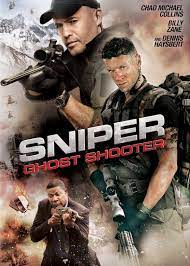
SNIPER: GHOST SHOOTER
US, 2016, 96 minutes, Colour.
Chad Michael Collins, Billy Zane, Dennis Haysbertd, Nick Gomez, Ravil Isyanov, Stefanie Vogt, Enoch Frost, Dominic Matham.
Directed by Don Michael Paul.
Another in the somewhat prolific franchise of Sniper action adventures. The franchise began in 1993 with Sniper, Tom Berenger in the title role. He took up sequels, Sniper 2, Sniper 3 in the early 2000 is. In 2008 it was decided to begin a new series focusing on Berenger’s son, played by Chad Michael Collins. And this continued for 15 years, at least, into the 2020s. (And Tom Berenger appeared in two of them.). This film was released straight to video in its time.
Also in the cast are Billy Zane and Dennis Haysbert who both appeared in other Sniper films. Billy Zane is seen here in action as a sniper but in the succeeding film, Ultimate Kill, he appears as a Washington bureaucrat.
One of the advantages of most of the Sniper films is the emphasis given to location photography, the great deal of attention given to the locations, beauty, practical life, and overall immersion of the audience. In this film, the opening is in Turkey moving to Istanbul. The action then transfers to Georgia, a pipeline through the countryside to Eastern Europe, and then action in beautiful snowclad mountains.
The plot is familiar, the audience identifying the goodies and the baddies and not worrying too much about the details of what is going on because so much of it will be fighting and sniping.
Chad Michael Collins has made this role his own. Although, in the first sequence, he freezes and does not shoot a child who, in fact, conceals a bomb. However, the authorities encourage him and he then is ordered to be part of the action in Georgia, in attack on ground level which goes wrong (as is usual in these Sniper films), the discovery of an expert Sniper, then in action on the mountains, along with a Russian whom he is able to save during an attack.
As always, some of the fellow-fighters and snipers are women, and there is also a woman in authority.
So, lots of fighting, ambushes, lots of shooting, a great deal of attention given, especially in the final confrontation about the skills and accuracy of the Sniper. And, with modern technology, the commander is able to watch all the action on screen and make directions and decisions as he watches.
Direction by actor Don Michael Paul also can directed another Sniper action.
- The popularity of the Sniper franchise? The originals? The series with Chad Michael Collins? This film early in this series?
- The focus on snipers, their weapons, their accuracy, their personalities, geared to kill, orders to kill? Moral issues? As raised in the dialogue?
- The Marines, training, codes, action, independence, collaborations? Beckett and his background, being part of team, relationship with the authorities? His personality?
- The opening, the mission in Turkey, the ambush, shooting, Beckett freezing, the boy, the bomb? The aftermath, in Istanbul, the encounter with the woman, his being enlisted for Georgia, discovering her place in command?
- The Colonel, watching action on the screen, the technician and his voicing the commands?
- Georgia, the situation, the pipeline, the government, business leads, manipulation for ownership, discussions with the locals? The target for snipers?
- The action sequence, the convoy, the shooting, the businessman and his own Sniper and skills? Deaths?
- The sequences in the mountains, the Russian as part of the team, discussions with Beckett, the thieves in the mountain, the confrontation, the backup, shooting, their taking the Russian, Beckett and his sniping and freeing the Russian?
- The final confrontation, the death of the Sniper, Beckett and his skills and achievement?
- The personalities of the team, the Russian, the women, Billy Zane, the Colonel and his visits in Istanbul?
- A film for those who like this kind of action adventure?
Requiem for a Dream
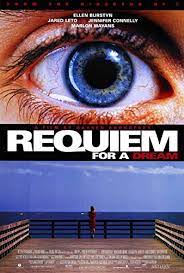
REQUIEM FOR A DREAM
US, 2000, 101 minutes, Colour.
Ellen Burstyn, Jarrod Leto, Jennifer Connolly, Marlon Wayans, Christopher McDonald, Louise Lasser, Keith David, Mark Margolis.
Directed by Aaron Aronofsky.
A grim title. And the film lives up to this title, a pessimistic elegy for the drug-shattered dreams of some ordinary people. I came out of the preview with a nurse trained in a psychological unit who sadly reassured me that she had seen many patients like the characters in the film. For her it was very real.
This is not a film for relaxing enjoyment. Many audiences will find the going too tough, too close to the bone - or, perhaps, far removed from their everyday experience. It is a film of desperation.
Some of us live neat and tidy lives. Others of us can be thrust into the depths: loneliness, betrayals of relationships, accidents, illness, relations with drug addictions, suicide. A film like Requiem for a Dream puts it all on the screen, challenging us emotionally as we share the despairs of trapped people. Some years ago, Irvine Welsh's book Trainspotting was filmed vividly and cleverly, a glimpse into the world of addicts. However, the central characters were young, offbeat, off-kilter, partly comic. This time the characters are more ordinary, people next door. And that makes it harder for us as well as more challenging.
While Hugh Selby Jr's original novel was published in 1978, it seems all the more relevant today. Writer-director, Darren Aronofsky, had made a small-budget film, Pi, about the meaning of science and life. This, his second film is about the meaninglessness of life. Together, Selby and Aronofsky are reminding us of how the needs of people today, isolated in our cities, are met, deliberately or unwittingly, by the drug culture and can end in disaster.
But the central character of this film, Sara Goldfarb, brilliantly played by Ellen Burstyn, is a widow nearing 70 who loves watching a hyped television personality with a self-help show. She dreams of appearing on it. When the letter comes, she begins to diet to fit into the red dress she wants to wear when she goes before the cameras and when everyone will love her. A mercenary and callous doctor prescribes a course of pills which ultimately control her, leading to breakdown and shock treatment. The film is an indictment of the drug culture and dependency of older citizens.
Sara's son, Harry, has graduated college but has become a heroin addict, along with his friend, Tyrone. They begin to deal to make money to start a dress shop for Harry's friend, Marian, also an addict. Their lives also collapse over a period of six months into prison, prostitution, illness and gangrenously infected limbs. The cautionary tale is frightening.
The director uses a number of cinematic techniques: colour and black and white photography, split screen, hallucination and dream sequences to try to communicate the mixture of reality and unreality in these people's tormented lives. There is also a powerful musical score, a blend of the classical and the contemporary beat.
This is a well-made film, a specialist film, one probably best discussed and related to our own social problems and the government, church and society agencies who struggle to deal with them.
- The title, expectations? The grim tone of Requiem? Indications of dreams, American dreams?
- Acclaim for the film of the time, Ellen Burstyn and Oscar nomination, early in the career of the directors and his subsequent career?
- The New York setting, Brooklyn and Coney island, the streets, apartments, the beach? Drug dealing and buildings? Police, prison? The television studio? The musical score, the range of songs?
- The film as surreal in its style? The basic realism? The visualisation of fantasies and dreams? Fade to white instead of black? The repetitions, the television show, on the screen, in the studio? The editing, fast pace, speeded camera? The recurring collage of the taking of the drugs and its and their effects? The overall effect of this kind of style?
- The end of the 20th century, American dreams, the older generation, ageing happily, family, some acknowledgement, watching television, self-help, enraptured by television? Doctors, prescriptions, pills, the impact, delusions, hospitalisation, institutions? The contrast with the younger generation, drugs and escape?
- Sarah, Ellen Burstyn’s performance, age, widow, with the other women, sunning themselves in the street, gossip? Her relationship with Harry? His taking the television with Tyrone, Hocking it, his mother coming in buying it back? The observations of the dealer, warning her? His attitude towards Harry? Sarah and her memories of her husband, memories of her son, ordinary life, but watching the television and the show, caught up in it?
- The television show, the compere and his enthusiasm, the audience, the captions on screen, the shouting audience, competition, winners? Sarah and the phone call, the opportunity to be on the show, her eagerness, wanting some moments of acknowledgement and fame? The red dress, unable to fit, getting aided to help her, Ada and the hair rinse, orange instead of red? And the red dress becoming part of the fantasy, imagining herself going to the show, the host, celebration, talking about her family? The fantasy then becoming more distorted? The characters entering into the room, disturbing Sarah? Her desperation, going to the studio, the confrontation, the staff, getting help, taking her to hospital, the drugs, treatment, the horror of the electric shock, the consequences, in the institution?
- Harry, the drugs, friendship with Tyrone, sharing the drugs, getting the drugs, selling them, the plans to make money, the hidden box with the cash? Harry and his relationship with Marion, the sequence of the building, unlocking the top floor, the alarm and escaping in the elevator, the standing and watching the view of Coney island? Her personality, background, design? Yet the dependence on the drugs? The lyrical scenes with Harry and Marion together, but the drugtaking scenes, and the effect of the drugs? Marion, the dinner with the client, their discussions, the sexual encounters? Her growing desperation, the meeting with Big Tim, his behaviour, the sexual encounter, the return, the graphic touches of the orgies sequence? The consequences for Marion, disillusioned with Harry, harsh towards him, and attempted reconciliation?
- Tyrone, the drugs, his girlfriend, the money, the police, the chase, his being caught, interrogated, behind bars, Harry and his infected arm, Tyrone and his future?
- Harry, the drugs, spending the money, little left in the box, his injections, his infected arm? His collapse, hospital, the amputation of his arm?
- His trying to see his mother, the visit?
- The final images, Marion continuing, trying to work, but the personality collapse, the aftermath of the drugs? The sexual experiences? Harry, death? Sarah, the institution, losing her mind and herself?
- The savage portrait of American dreams – and the requiem for the central characters?
Population 436
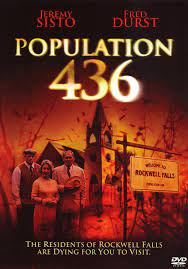
POPULATION 436
US, 2006, 92 minutes, Colour.
Jeremy Sisto, Fred Durst, Charlotte Sullivan, Peter Outerbridge, David Fox, Reva Timbers.
Directed by Michelle McLaren.
Population 436 is one of those eerie films, atmosphere of the Twilight Zone.
Jeremy Sisto plays an Inspector, checking on population figures in outlying towns in North Dakota. Arriving, he sees a woman fall from a horse, crashes his car, is given a lift by the deputy sheriff. He is welcomed by the population, by the Mayor, honoured, given accommodation. But, as he stays in the town he notices more and more strange behaviour. At a Festival, procession in celebration, a woman sacrifices herself.
It emerges that this remote community has religious fanaticism, believing that it will survive by keeping population 436, killing anyone who increases that number. It also emerges that the doctor keeps some of the population who want to leave under control, even with electric shock treatment.
The inspector has strange dreams, is attracted to the young woman, daughter of his host where he is staying, as well as a young girl who wants to leave. When he makes up his mind to go, he is held by the doctor, but escapes, taking the young girl with him but leaving behind the daughter who is already been affected the doctor.
As they make their escape, at the exit from the town, they are hit by a semitrailer.
The film ends with the inspector’s successor arriving in the town to discover what has happened.
- The title, the focus on the population, the small town, the exact number, its sinister meaning? Religious meaning?
- The setting, North Dakota, the open plains, the small town, homes, stores, sheriff’s office, doctor’s office, the celebration? The musical score?
- Steve Kadey, government official, the Census bureau, checking on the town? Age, personality, diligence? Entering the town, the woman falling from the horse, his flat tires, the deputy sheriff, the welcome, the mayor, accommodation, the daughter of the house, the jealousy of the sheriff? His becoming more and more wary, strange dreams, the odd behaviour of the population? The celebration, the woman sacrificing herself?
- The people in the town, midwest American types the sheriff, law and order, the Deputy, the mayor? The role of the doctor? The host, Courtney, Steve’s attraction?
- The realisation that the population must be kept to 436, any increase means death, Steve taken by the doctor, the treatment, his escape, wanting Courtney to leave, but her being already conditioned by the doctor, with Amanda?
- The road to escape, the oncoming vehicle, the crash?
- And the eerie ending, anticipation of repetition with Steve’s successor arriving in the town to continue his work?
Togo
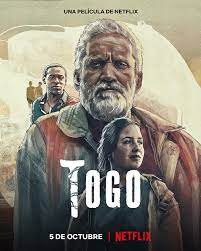
TOGO
Uruguay, 2022, 93 minutes, Colour.
Diego Alonzo, Catalina Arrillaga, Jose Pagano.
Directed by Israel Adrian Caetano.
Audiences do not usually see films from Uruguay. Here is an opportunity.
It is a brief film with a narrow focus. Togo, the title character, is an elderly man, living on the street, a former boxer, a friend who is wheelchair bound. Their job is to organise the entry, parking, exit of cars in their particular zone. Togo is a sympathetic character.
There are two main complications. A young woman, Mercedes, dosses down in his area, depressed. And she offers to work in parking the car is but makes a mess of her initial attempt. It emerges that she comes from a wealthy family, not appreciating her mental condition, her leaving. Ultimately, Togo persuades her to go home.
The other complication is drug dealing in the streets, in the particular areas, controlled by a boss who is wealthy, controls clubs, has young workers on the streets selling the drugs. Eventually, they confront Togo, attempts to bash him, but he with his skills, getting the better of them. There are also threats to Mercedes. And, ultimately, the confrontation with the boss.
Familiar material, but a sympathetic central character and an opportunity to look at something of urban life in Uruguay.
- Audiences not seeing films from Uruguay, an opportunity to see facets of inner-city life?
- The city setting, the open places, the secluded areas for sleeping rough, the streets, the parking zones? The musical score?
- Togo himself, his past as a boxer, his age, his friendship with the man in the chair, their work in parking the cars, guiding them? The tips? Survival? The friendship, the man in the chair and his having to withdraw, Togo and his visit? Looking after his own?
- The various zones, Togo observing the drug dealers, intruding into the zones, the threats, the fights, Togo and his boxing past, able to confront the young men?
- Mercedes, intruding, the encounter with Togo, his care for her, her wanting to guide the traffic, betting, failing to control the traffic, yet his letting her stay, her sleeping rough outside? The revelation about her wealthy family, the scenes at home? Her depression?
- The drug dealers, their personalities, their boss and his nomination, his way of life? The contacts, moving in, treatment of Mercedes, treatment of Togo?
- The confrontation, Togo and his fight, the boss and his underlings?
- Togo urging Mercedes to go home, her return to her family?
- A slice of life, on the streets in Uruguay, a portrait of a veteran old man?
Aligarh
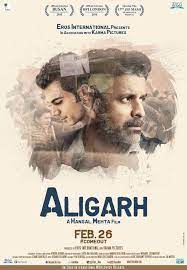
ALIGARH
India, 2015, 114 minutes, Colour.
Manoj Bajpayee, Rajkummar Rao.
Directed by Hansal Mehta.
Aligarh is a city in Uttar Pradesh. Its University is amongst the top three intellectual centres in India.
This film is based on actual characters and events, filmed only a few years after they occurred. For those interested in further detail, the Wikipedia entries concerning the Professor as well as his court case provided information.
Manoj Bajpayee gives an excellent, restrained performance as a linguistics academic, a published poet, who is seen coming to his house in a rickshaw, then home invasion by photographers, then the presence of three academics from the University, discovering him in a homosexual relationship with the rickshaw driver. The academics are there, allegedly, to stop any scandal for the University but, the next day, the story and photos are in all the local papers. The Professor is brought before the university authorities, suspended, castigated for his behaviour and the scandal, told to move out of his house within a week.
In the meantime, the story attracts the attention of a young deli journalist, Deepu, who comes to Aligarh to interview the Professor, along with an over-eager photographer. He shows sympathy, gets into the apartment, but the Professor reacts to his questions and sees the photographer. Later, Deepu tries again, helping the Professor connect power to his house when the university authorities have cut it off.
The Professor is reticent, talks about his poetry to Deepu, gives him a signed copy. Later, during his trial, bored, he translates the poems into English and again gives the journalist copy.
The Professor is persuaded to go to court even though he does not wish it. Decriminalisation of homosexuality had been recently withdrawn, so there was a case for charges for the, invasion of his privacy, invasion of his home.
There are court sequences, a barrister had been involved in the social legislation for the Professor, the loudly-spoken woman has prosecution, giving all the arguments the reputation of the University.
Ultimately, Deepu writes his article after trying to track down the rickshaw man and had been bashed by the people in his town. He is acclaimed for his writing, is promoted, goes to see the Professor and is promised an interview but, that night, the Professor dies. Poison is founded his system, suicide suspected. Later accusations were made about his murder.
Soon after, homosexuality was re-criminalised. And this film came out the following year.
- Based on a true story? India and the 2000s? Indian society, the issue of homosexuality, criminalisation, change in legislation, reverting to criminalisation in 2014?
- This film as a portrayal of the history of the events, as a protest against the criminalisation?
- The title, the area in Uttar Pradesh, the city, the status of the University? Its reputation, status, the action of the authorities against the Professor?
- The picture of the city, immersing the audience in the atmosphere, the streets, the rickshaw, day and night, the house, the exterior windows, the interiors? The University offices? The different hotels and accommodation? The court hearings? And the demonstrations in the streets? The musical score?
- The situation, the professor and the rickshaw, going into the house, the home invasion, filming the professor and his partner, the photographs, the arrival of the authorities, the humiliation, not allowing them their clothes, the alleged secrecy, the newspapers all publishing the news and photos? The scandal?
- Deepu, journalist, his work at the paper, his boss, interested in the story, wanting to follow through? His work with his photographer? The attempts to see the professor, helping him, questions, the photographer and his incessant taking pictures despite Deepu trying to stop him? Deepu ousted? His later visiting the professor, helping him with the electricity, a more sympathetic hearing, the professor explaining himself and his story? Deepu’s response, writing the article?
- Deepu, at home, his aunt, the children, his being upset, walking out? At the office, his eventually publishing the article, his promotions, acclaim?
- The film’s portrait of the professor, age, a quiet man, the story of his life, severity of his upbringing, his studies, languages, specific language in Aligarh, a poet, his poetry, the recitation of the poems, especially about the moon, Deepu listening, the professor giving him a book, signed, (and his later translating the poem during the court case and giving Deepu the manuscript)?
- Issues of homosexuality, criminalised in India, the change? The demonstrators? The professor unwilling to go to court, quiet, persuaded? His sitting in the court, bored, nodding off, translating his poems? The background of his having to move, the University ousting him, alternate accommodation, his being pursued, his not being married and therefore having to leave accommodation?
- The discussions with the barristers, the sympathetic barrister, especially his connection with the decriminalisation legislation? The prosecution and her severity, shouting, talking over people? The judge, listening?
- The small court room, the shared lectern, the Professor sitting on the window ledge, the statements, the arguments, the University, exceeding its role, invading privacy, the commissioning of the photographs, the publication?
- Deepu, his trying to track down the rickshaw man? His being beaten? And the suggestion of the collusion by the rickshaw driver, the sequences of the lights going on and off, as a signal for outsiders?
- The aftermath of the case, Deepu and his writings, his visiting the professor, the professor and his being weary, promising for an interview the day after next, his lying back, his death?
- Reports that he had committed suicide, poison found? Later investigations, culprits charged but the case not proven?
- The sympathetic portrait of a gay man, quiet, not flamboyant, persecuted?
- The film being made soon after the re-criminalisation of homosexuality?